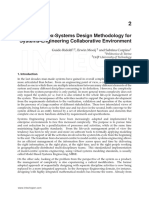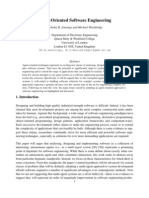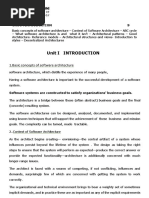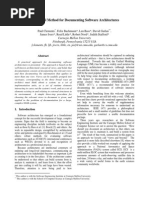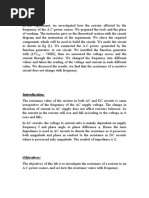Tutoria, Read
Tutoria, Read
Uploaded by
Angela Tatiana Benavides VelaCopyright:
Available Formats
Tutoria, Read
Tutoria, Read
Uploaded by
Angela Tatiana Benavides VelaOriginal Title
Copyright
Available Formats
Share this document
Did you find this document useful?
Is this content inappropriate?
Copyright:
Available Formats
Tutoria, Read
Tutoria, Read
Uploaded by
Angela Tatiana Benavides VelaCopyright:
Available Formats
1
SYSTEMS ENGINEERING
AND THE WORLD OF
MODERN SYSTEMS
1.1 WHAT IS SYSTEMS ENGINEERING?
There are many ways in which to define systems engineering. For the purposes of this
book, we will use the following definition:
The function of systems engineering is to guide the engineering of complex systems.
The words in this definition are used in their conventional meanings, as described
further below.
To guide is defined as “to lead, manage, or direct, usually based on the superior
experience in pursuing a given course” and “to show the way.” This characterization
emphasizes the process of selecting the path for others to follow from among many
possible courses—a primary function of systems engineering. A dictionary definition
of engineering is “the application of scientific principles to practical ends; as the design,
construction and operation of efficient and economical structures, equipment, and
systems.” In this definition, the terms “efficient” and “economical” are particular con-
tributions of good systems engineering.
The word “system,” as is the case with most common English words, has a
very broad meaning. A frequently used definition of a system is “a set of interrelated
Systems Engineering Principles and Practice, Second Edition. Alexander Kossiakoff, William N. Sweet,
Samuel J. Seymour, and Steven M. Biemer
© 2011 by John Wiley & Sons, Inc. Published 2011 by John Wiley & Sons, Inc.
c01.indd 3 2/8/2011 11:04:29 AM
4 SYSTEMS ENGINEERING AND THE WORLD OF MODERN SYSTEMS
components working together toward some common objective.” This definition implies
a multiplicity of interacting parts that collectively perform a significant function. The
term complex restricts this definition to systems in which the elements are diverse and
have intricate relationships with one another. Thus, a home appliance such as a washing
machine would not be considered sufficiently diverse and complex to require systems
engineering, even though it may have some modern automated attachments. On the
other hand, the context of an engineered system excludes such complex systems as
living organisms and ecosystems. The restriction of the term “system” to one that is
complex and engineered makes it more clearly applicable to the function of systems
engineering as it is commonly understood. Examples of systems requiring systems
engineering for their development are listed in a subsequent section.
The above definitions of “systems engineering” and “system” are not represented
as being unique or superior to those used in other textbooks, each of which defines
them somewhat differently. In order to avoid any potential misunderstanding, the
meaning of these terms as used in this book is defined at the very outset, before going
on to the more important subjects of the responsibilities, problems, activities, and tools
of systems engineering.
Systems Engineering and Traditional Engineering Disciplines
From the above definition, it can be seen that systems engineering differs from mechani-
cal, electrical, and other engineering disciplines in several important ways:
1. Systems engineering is focused on the system as a whole; it emphasizes its total
operation. It looks at the system from the outside, that is, at its interactions with
other systems and the environment, as well as from the inside. It is concerned
not only with the engineering design of the system but also with external factors,
which can significantly constrain the design. These include the identification of
customer needs, the system operational environment, interfacing systems, logis-
tics support requirements, the capabilities of operating personnel, and such other
factors as must be correctly reflected in system requirements documents and
accommodated in the system design.
2. While the primary purpose of systems engineering is to guide, this does not
mean that systems engineers do not themselves play a key role in system design.
On the contrary, they are responsible for leading the formative (concept devel-
opment) stage of a new system development, which culminates in the functional
design of the system reflecting the needs of the user. Important design decisions
at this stage cannot be based entirely on quantitative knowledge, as they are for
the traditional engineering disciplines, but rather must often rely on qualitative
judgments balancing a variety of incommensurate quantities and utilizing expe-
rience in a variety of disciplines, especially when dealing with new
technology.
3. Systems engineering bridges the traditional engineering disciplines. The diver-
sity of the elements in a complex system requires different engineering disci-
c01.indd 4 2/8/2011 11:04:29 AM
ORIGINS OF SYSTEMS ENGINEERING 5
plines to be involved in their design and development. For the system to perform
correctly, each system element must function properly in combination with one
or more other system elements. Implementation of these interrelated functions
is dependent on a complex set of physical and functional interactions between
separately designed elements. Thus, the various elements cannot be engineered
independently of one another and then simply assembled to produce a working
system. Rather, systems engineers must guide and coordinate the design of each
individual element as necessary to assure that the interactions and interfaces
between system elements are compatible and mutually supporting. Such coor-
dination is especially important when individual system elements are designed,
tested, and supplied by different organizations.
Systems Engineering and Project Management
The engineering of a new complex system usually begins with an exploratory stage in
which a new system concept is evolved to meet a recognized need or to exploit a tech-
nological opportunity. When the decision is made to engineer the new concept into an
operational system, the resulting effort is inherently a major enterprise, which typically
requires many people, with diverse skills, to devote years of effort to bring the system
from concept to operational use.
The magnitude and complexity of the effort to engineer a new system requires
a dedicated team to lead and coordinate its execution. Such an enterprise is called
a “project” and is directed by a project manager aided by a staff. Systems engineering
is an inherent part of project management—the part that is concerned with guiding
the engineering effort itself—setting its objectives, guiding its execution, evaluating
its results, and prescribing necessary corrective actions to keep it on course. The man-
agement of the planning and control aspects of the project fiscal, contractual, and
customer relations is supported by systems engineering but is usually not considered
to be part of the systems engineering function. This subject is described in more detail
in Chapter 5.
Recognition of the importance of systems engineering by every participant in a
system development project is essential for its effective implementation. To accomplish
this, it is often useful to formally assign the leader of the systems engineering team to
a recognized position of technical responsibility and authority within the project.
1.2 ORIGINS OF SYSTEMS ENGINEERING
No particular date can be associated with the origins of systems engineering. Systems
engineering principles have been practiced at some level since the building of the pyra-
mids and probably before. (The Bible records that Noah’s Ark was built to a system
specification.)
The recognition of systems engineering as a distinct activity is often associated
with the effects of World War II, and especially the 1950s and 1960s when a number
of textbooks were published that first identified systems engineering as a distinct
c01.indd 5 2/8/2011 11:04:29 AM
You might also like
- 062 - Radio Navigation - QuestionsDocument44 pages062 - Radio Navigation - QuestionsEASA ATPL Question Bank75% (4)
- Systems Engineering - Practice and TheoryDocument363 pagesSystems Engineering - Practice and Theoryobama134100% (14)
- M6 Rev01 inDocument28 pagesM6 Rev01 inBruno MarianoNo ratings yet
- A SysML-based Methodology For Mechatronic Systems PDFDocument14 pagesA SysML-based Methodology For Mechatronic Systems PDForbedelodoNo ratings yet
- System Design NotesDocument3 pagesSystem Design Notesdolon100% (1)
- Answer: Missions in Its Environment. (IEEE 1471)Document5 pagesAnswer: Missions in Its Environment. (IEEE 1471)Linh BuimanhNo ratings yet
- IB 22levisDocument9 pagesIB 22levisdukeNo ratings yet
- Lecture 1Document14 pagesLecture 1kere evaNo ratings yet
- Systems Engineering: Why Is It Important?: February 2015Document7 pagesSystems Engineering: Why Is It Important?: February 2015Jay Mark VillarealNo ratings yet
- All LecturesDocument251 pagesAll Lecturesjdif0001No ratings yet
- Systems EngineeringDocument10 pagesSystems EngineeringDipak DeyNo ratings yet
- System Engineering BroadDocument7 pagesSystem Engineering BroadPaulo CabeceiraNo ratings yet
- What Is Your Definition of Software Architecture?Document6 pagesWhat Is Your Definition of Software Architecture?DescargadorNo ratings yet
- Sadp Unit-1Document43 pagesSadp Unit-1vasavisai kNo ratings yet
- CSci210 Paper CorselloDocument10 pagesCSci210 Paper CorselloMichael CorselloNo ratings yet
- Introduction To Systems EngrDocument44 pagesIntroduction To Systems Engrfehintolaolaniyi2021No ratings yet
- Agent-Based Control SystemsDocument30 pagesAgent-Based Control SystemsSwagath Kumar PandaNo ratings yet
- QUIZ 4 ANSWER KEYDocument5 pagesQUIZ 4 ANSWER KEY2021304361No ratings yet
- Prospects For Systems Engineering Process Dynamics: Susan FerreiraDocument5 pagesProspects For Systems Engineering Process Dynamics: Susan FerreiraMayzza PutriNo ratings yet
- SE All in One AnswersDocument54 pagesSE All in One AnswersshishirkashyapNo ratings yet
- Module 1 2Document23 pagesModule 1 2Randy SiervoNo ratings yet
- Assignment 2: Q.1: Explain System Design? AnsDocument6 pagesAssignment 2: Q.1: Explain System Design? AnsshowkatNo ratings yet
- Chapter 8 - SW ArchiDocument23 pagesChapter 8 - SW ArchiAli HassanNo ratings yet
- App 1Document22 pagesApp 1thippanaboinanandiniNo ratings yet
- 4a. Introduction To Software ArchitectureDocument20 pages4a. Introduction To Software ArchitecturelubangapNo ratings yet
- System Integration and Architecture 001Document25 pagesSystem Integration and Architecture 001richard limNo ratings yet
- Sciencedirect: Complexity in A Life Cycle PerspectiveDocument6 pagesSciencedirect: Complexity in A Life Cycle Perspectivevincent BarreauNo ratings yet
- Sa Unit1Document35 pagesSa Unit1Ms.R.KalaiyarasiNo ratings yet
- HW01 Software ArchtectureDocument9 pagesHW01 Software ArchtectureNasis DerejeNo ratings yet
- InTech-Creating Synergies For Systems Engineering Bridging Cross Disciplinary StandardsDocument27 pagesInTech-Creating Synergies For Systems Engineering Bridging Cross Disciplinary StandardsOroitz Elgezabal GómezNo ratings yet
- BSS 310 System EngineeringDocument57 pagesBSS 310 System EngineeringMicaelaNo ratings yet
- Unit-1 ComplexityDocument33 pagesUnit-1 ComplexitysumathiratnamistsNo ratings yet
- Modular Views On Software Architecture SystemsDocument8 pagesModular Views On Software Architecture SystemsIAEME PublicationNo ratings yet
- Systems Theory: Home Work No. 1Document7 pagesSystems Theory: Home Work No. 1Bogdan BîngăNo ratings yet
- Systems Engineering PresentationDocument31 pagesSystems Engineering PresentationhrsreenathNo ratings yet
- SE Unit 1Document6 pagesSE Unit 1PAVANNo ratings yet
- Knowledge Area: Systems FundamentalsDocument31 pagesKnowledge Area: Systems Fundamentalsestefany mytchell noa ccalloNo ratings yet
- Complex-Systems Design Methodology For Systems-Engineering Collaborative EnvironmentDocument33 pagesComplex-Systems Design Methodology For Systems-Engineering Collaborative EnvironmentwaseheNo ratings yet
- System and Software System EngineeringDocument95 pagesSystem and Software System EngineeringCarlos CamargoNo ratings yet
- Overview of Architecture Frameworks and Modeling LDocument10 pagesOverview of Architecture Frameworks and Modeling Lmanuel mamaniNo ratings yet
- Notes Software ArchitectureDocument14 pagesNotes Software Architecturejayaprasanna123No ratings yet
- Ansi Ieee 1471Document23 pagesAnsi Ieee 1471jdiazsdsyahoo.com.mxNo ratings yet
- Requirements Engineering: A Roadmap: Bashar Nuseibeh Steve EasterbrookDocument10 pagesRequirements Engineering: A Roadmap: Bashar Nuseibeh Steve EasterbrookMarxjhony JerezNo ratings yet
- Agent-Oriented Software Engineering: Nicholas R. Jennings and Michael WooldridgeDocument24 pagesAgent-Oriented Software Engineering: Nicholas R. Jennings and Michael WooldridgeDũng TrầnNo ratings yet
- Unit I IntroductionDocument43 pagesUnit I IntroductionMs.R.KalaiyarasiNo ratings yet
- A R S A: Eview On Oftware RchitectureDocument3 pagesA R S A: Eview On Oftware Rchitecturejaja jajaNo ratings yet
- !!! - Complexity Primer For SE July 2015Document10 pages!!! - Complexity Primer For SE July 2015omanevNo ratings yet
- UNIT-1 The Architecture Business Cycle: Rajasekhar, SEATDocument21 pagesUNIT-1 The Architecture Business Cycle: Rajasekhar, SEATBonheuNo ratings yet
- System EngineeringDocument11 pagesSystem Engineeringapi-26349602100% (2)
- Basic Concepts On Systems of Systems: Provided by Springer - Publisher ConnectorDocument39 pagesBasic Concepts On Systems of Systems: Provided by Springer - Publisher ConnectorDanang SutawidjayaNo ratings yet
- Chapter 6 - SW DesignDocument14 pagesChapter 6 - SW DesignAli HassanNo ratings yet
- Requirements Engineering - A RoadmapDocument10 pagesRequirements Engineering - A RoadmapEdilson LanzilloNo ratings yet
- A Practical Method For Documenting Software ArchitecturesDocument10 pagesA Practical Method For Documenting Software ArchitecturesFoxman2kNo ratings yet
- Software Architecture:: Unit I Introduction and Architectural DriversDocument14 pagesSoftware Architecture:: Unit I Introduction and Architectural Driversjrajesh50% (1)
- Software Architecture Lecture-1Document12 pagesSoftware Architecture Lecture-1shahid khan MmdNo ratings yet
- Introduction To Software ArchitectureDocument89 pagesIntroduction To Software ArchitectureAnkit SanghviNo ratings yet
- (Systems Engineering 2019-Jul 10 Vol. 23 Iss. 2) Shafaat, Ali - Kenley, C. Robert - Model Based Design of Project Systems, Modes, and States (2019)Document12 pages(Systems Engineering 2019-Jul 10 Vol. 23 Iss. 2) Shafaat, Ali - Kenley, C. Robert - Model Based Design of Project Systems, Modes, and States (2019)Aniss BONo ratings yet
- Systems Engineering DevelopmentDocument5 pagesSystems Engineering DevelopmentpirotteNo ratings yet
- Module 1Document30 pagesModule 1JaveriaNo ratings yet
- Quiz 1Document1 pageQuiz 1Ice coldNo ratings yet
- Oracle Internals Tips and Technical Trips: Ch. V.N.Sanyasi Rao, Tiruveedula Gopi KrishnaDocument5 pagesOracle Internals Tips and Technical Trips: Ch. V.N.Sanyasi Rao, Tiruveedula Gopi KrishnalvtzlbNo ratings yet
- Over Current Protection Alternatives Motor Current Control With INA240Document37 pagesOver Current Protection Alternatives Motor Current Control With INA240yb3hgf2222No ratings yet
- CBS305Document22 pagesCBS305sareluis30No ratings yet
- Smart PCSDocument2 pagesSmart PCSdini riyandiniNo ratings yet
- Geo Brick LVDocument270 pagesGeo Brick LVChandru ChristurajNo ratings yet
- Electricity Shobhit NirwanDocument20 pagesElectricity Shobhit NirwanVinit Lahoti100% (1)
- A Review of Battery Electric Vehicle Technology and Readiness LevelsDocument2 pagesA Review of Battery Electric Vehicle Technology and Readiness LevelsTrending NowNo ratings yet
- Proposed in THE 35 Tripartite Technical Experts Group (TTEG) Yogyakarta, 4-5 October 2010Document8 pagesProposed in THE 35 Tripartite Technical Experts Group (TTEG) Yogyakarta, 4-5 October 2010Simbat Ya SimbatNo ratings yet
- Siemens FMX 2Document252 pagesSiemens FMX 2Nicolaie Nicusor100% (1)
- A318 - A319 - A320 - A321 - ESPM - 01-Nov-2023 - 20-52-24-700-000-012 - Insulation Test (AIRBUS)Document4 pagesA318 - A319 - A320 - A321 - ESPM - 01-Nov-2023 - 20-52-24-700-000-012 - Insulation Test (AIRBUS)Dilshan PriyadharshanaNo ratings yet
- Technical CENTURION C SeriesDocument28 pagesTechnical CENTURION C Seriesمحمدعبدالخالق العلوانيNo ratings yet
- IEEE Article Processing Charges ListDocument8 pagesIEEE Article Processing Charges ListAHMEDNo ratings yet
- Name: Lalitha.G Reg. No: 19BEC1371 Course Code: ECE2006 Course: Computer Organization and Architecture Module-2 1 MARK MCQ (10x1 10) A) 100010Document10 pagesName: Lalitha.G Reg. No: 19BEC1371 Course Code: ECE2006 Course: Computer Organization and Architecture Module-2 1 MARK MCQ (10x1 10) A) 100010Lalitha GuruswaminathanNo ratings yet
- Recent Trends of BankingDocument33 pagesRecent Trends of BankingMohd Aquib0% (1)
- Notes of Unit - V (SE, KCA-302) MCA III Sem-1Document55 pagesNotes of Unit - V (SE, KCA-302) MCA III Sem-1Aditi GoelNo ratings yet
- CV - One Page - Ossama KHeadry AwadDocument1 pageCV - One Page - Ossama KHeadry AwadOsama KheadryNo ratings yet
- Statement of Account: Transaction DetailsDocument4 pagesStatement of Account: Transaction Detailsshanil naiduNo ratings yet
- Return Invoice 231.8.2023Document2 pagesReturn Invoice 231.8.2023ahmed.zulkhaireNo ratings yet
- Discrete PID Controller On tinyAVR and megaAVR DevicesDocument10 pagesDiscrete PID Controller On tinyAVR and megaAVR DeviceskeisinhoNo ratings yet
- Mvi56e GSC User ManualDocument155 pagesMvi56e GSC User ManualDavid ChoklerNo ratings yet
- HelpDesk CA TEST 1Document35 pagesHelpDesk CA TEST 1Keshia MullerNo ratings yet
- Dun & Bradstreet PDFDocument8 pagesDun & Bradstreet PDFWaad AlteeNo ratings yet
- CCNA 1 Final Exam Answers v6.0Document42 pagesCCNA 1 Final Exam Answers v6.0Ahmad FajriNo ratings yet
- Exercises 55: Electrical Analysis: New Features For Revit MEP 2023Document6 pagesExercises 55: Electrical Analysis: New Features For Revit MEP 2023Muhammad RidhatamaNo ratings yet
- PM Debug InfoDocument133 pagesPM Debug InfoSantiago FreitezNo ratings yet
- Debit Card (Also Known As A Bank Card or Check Card) Is A Plastic Card That Provides AnDocument7 pagesDebit Card (Also Known As A Bank Card or Check Card) Is A Plastic Card That Provides Anmuthukumaran28No ratings yet
- Frequency ResponceDocument8 pagesFrequency Responceضياء بن احمد الكباريNo ratings yet





































